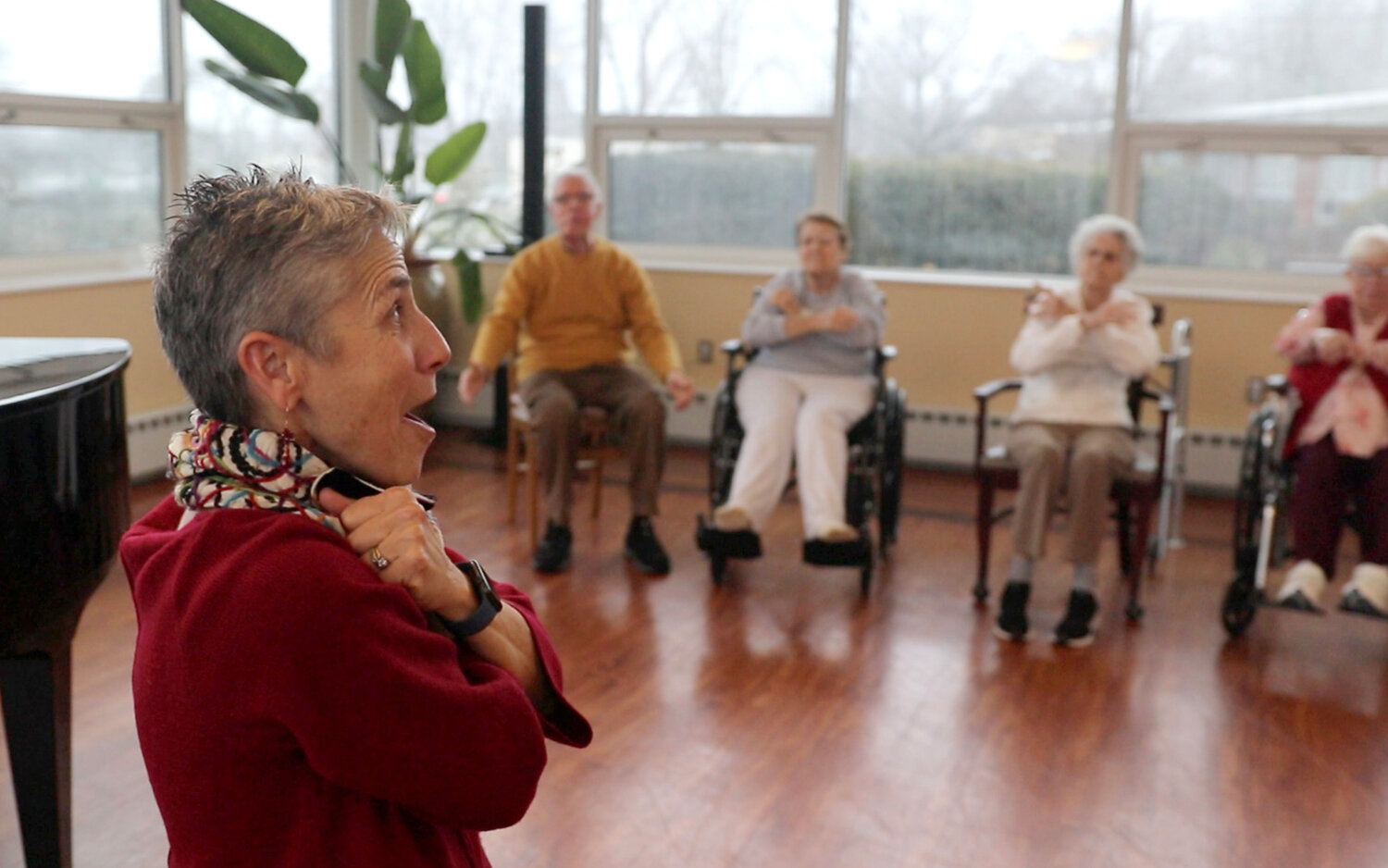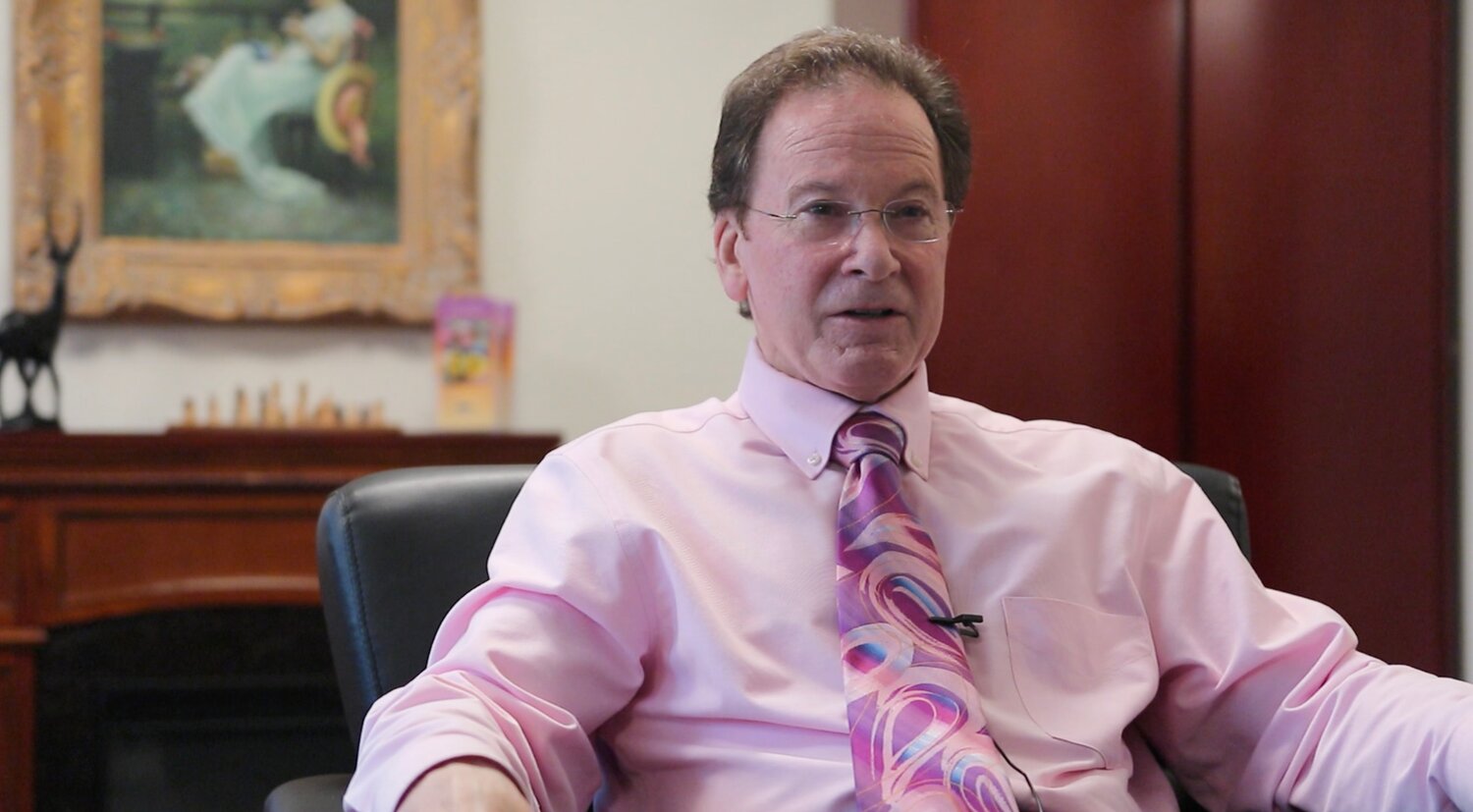Barry Zeltzer artfully elevates nursing-home living
A dozen seniors sit in a semicircle and dance. They raise their arms, tap their toes and swivel in their chairs. They follow the movements of their gregarious instructor, Rachel Balaban, as the Irving Berlin standard “I’ve Got My Love to Keep Me Warm” plays in the background.
Many of the seniors smile and laugh, hugging themselves with each refrain. Others concentrate with a serious mien – but everyone is participating.
In the back of the room stands Barry Zeltzer, 68, CEO of the Hattie Ide Chaffee Home, a nursing home in East Providence. Zeltzer watches as music therapist Shelley Katsh plays piano and gets the group singing along with her. He watches instructor Jada Wooten lead her own choreography to “Baby It’s Cold Outside.” He watches acting teacher Barry Marshall improvise a snowy scene and guide the group through simple pantomimes.
Zeltzer’s expression as he watches is a mix of intensity and pride.
“I’ve always been interested in the arts,” he says. “My goal is to create a model of nursing care that’s special.”
This is the Hattie Ide Chaffee Arts Academy, a year-old performing arts program for residents that was designed and organized by Zeltzer. Briefly described, the workshops might seem like typical nursing-home activities, intended to help residents pass the time. But Zeltzer has bigger ambitions: He has gathered seasoned professional artists to lead the classes.
For example, Marshall taught theater at Moses Brown for nearly 30 years, and Balaban co-founded the integrative Artists and Scientists as Partners program at Brown University. The academy’s team works closely together, so that each session has continuity and clear goals.
Zeltzer sees many nursing-home programs as a shrugging afterthought; the arts academy, he vows, will be a pioneer in quality.
“I wanted to make Hattie Ide Chaffee different,” says Zeltzer, who became CEO in late 2021. “Today, you have to step out of the box. Nobody wants to be in a nursing home. Our mission is to care for our residents in a dignified manner, and to extend that to their families.”
Zeltzer is trim, perhaps owing to his precise diet, with pinprick eyes and careful speech. He looks 20 years younger than his actual age, and he talks about Hattie Ide Chaffee with unwavering reverence.
“One of the most important things for me in developing this program,” he says, “is to bring an imaginative quality of life to our residents. I put myself in these residents’ shoes, and I think about, ‘What if I was in a nursing home? How would I want my lifestyle to be?’ ”
Zeltzer holds a PhD in Gerontology and Geriatric Psychiatry from the Union Institute & University, in Cincinnati. He served for four years as CEO of the New England Homes for the Deaf, in Danvers, Massachusetts, and three years as executive director of the former Ballou Home for the Aged, in Woonsocket. He also earned an MBA from Bryant University, which speaks to Zeltzer’s entrepreneurial management style.
A songwriter and visual artist himself, Zeltzer teaches a course called “Creative Arts with Seniors” for the Warren Alpert Medical School at Brown University.
He speaks eloquently about the cognitive and emotional needs of seniors and the general state of elder care, and he wants to see tangible results from the academy.
“Hattie Ide Chaffee residents experienced improved mood, mobility and cognition in the pilot project based on observational and survey data,” Zeltzer wrote in an email. “Residents also demonstrated greater use of their bodies. For instance, some elders who initially had difficulty lifting their feet off the floor or arms in the air can now extend their legs to hip level and complete a full circle with their arms. Other elders’ increased mobility is a result of improved cognition.
“Arts programming helped residents become more verbal, willing to interact, and encouraged eye contact.”
While Hattie Ide Chaffee is open to residents of all backgrounds, Zeltzer wants the facility to openly welcome Jewish seniors, and he invites all residents to learn about Judaism.
Zeltzer grew up in an Orthodox household in Providence, and he attended the Providence Hebrew Day School. Zeltzer, who no longer keeps kosher, recalled trying his first cheeseburger when he was a student at Classical High School.
Out of 63 residents at Hattie Ide Chaffee, only eight identify as Jewish, and the facility’s decor in December clearly skewed toward Christmas. Yet Zeltzer has overseen a kosher meals program and educational programs around the Jewish holidays that are open to all.
“We share Jewish values,” says Zeltzer. “There’s so much that we do here, as a group, [that is] just giving back. It’s not all about how much money [we can] make. It’s about what we can do for our population of residents. When I see what each artist-in-residence brings to the table, it’s amazing. They do their 50-minute workshop, but they do a lot more than that. There’s so much of their time that’s given to this organization and to this project that makes a huge difference.”
Bolstered by a grant from the Rhode Island State Council on the Arts, Zeltzer hand-picked the instructors, all of whom he already knew well before soliciting their help. Early recruits included Balaban and her dance-instructor colleague at Brown, Julie Strandberg, who specializes in neurodiverse dancers.
“I’ve always been very inspired by [Zeltzer’s] creativity and his vision,” says Balaban, who has known and collaborated with Zeltzer for about a decade. “Whenever he gives me a call, I’m always really eager to meet with him. His vision aligns with so much of the work that I do, which is bringing movement to people of all ages, but particularly to people with movement challenges.”
Zeltzer wants his academy to set a high bar and serve as a showcase for other nursing homes that have what he considers apathetic programming.
He is planning a weekly “Voices of the Elders Program,” a multi-activity storytelling series that will include residents as well as family and staff members.
He also wants to expand his roster of academy volunteers and increase funding.
Hattie Ide Chaffee already has a rigorously organized garden club, with its own board and bylaws, as well as a range of outdoor gardens.
“If we can bring people and resources and different kinds of lifestyles for our residents to enjoy, that’s important to me,” says Zeltzer. “I want people to automatically say, ‘This is exceptional.’ ”
ROBERT ISENBERG is a Cranston-based freelancer who writes for Jewish Rhode Island.











